Kaspersky Cannot Guarantee Authenticity of the Doamin What Should I Do Disconnect or Continue
Currently, we have no evidence to suggest that Kaspersky (headquartered in Russia) is a danger to its users. However, if you are concerned about Kaspersky becoming a threat to your security due to recent geo-political tensions, there are many suitable alternatives, such as Norton and Bitdefender.
Kaspersky has an excellent antivirus scanner and some pretty good web protections. It caught all of the malware samples I downloaded in my tests, and its anti-phishing protection detected most of the risky sites I tried visiting.
Kaspersky has some great additional features, too. I really like its parental controls, which are among the best around. I also like the Rescue Disk feature (which helps restore computers that won't boot due to malware), the secure browser, the virtual keyboard (which makes online payments more secure), and the premium version of the virtual private network (VPN).
But I'm not too impressed with some of Kaspersky's extras. The password manager is okay, but it's pretty basic — it doesn't even have essential features like two-factor authentication (2FA) or dark web monitoring, which all of the top password managers in 2022 provide. Kaspersky's system cleanup tools are decent, but competitors like Avira offer far more options. Furthermore, the free VPN only provides 200 MB/day of browsing data, and it only lets you connect to one server (the slowest one). Plus, the Backup and Restore feature is basically a free Dropbox account (Dropbox gives all users 2 GB storage space, so you're not really getting anything with this feature).
That said, I still think Kaspersky Total Security is a good internet security suite overall. It has a high-quality antivirus scanner, some really useful features, and affordable pricing. Kaspersky is also one of the more transparent antivirus companies. Since the 2017 allegations that it was working with the Russian government to steal US intelligence data, Kaspersky has moved its data processing centers to Switzerland, opened Transparency Centers around the world, and passed a SOC 2 audit.
Kaspersky offers 3 plans that cover 3–10 devices, it has great first-year discounts, and it offers a 30-day money-back guarantee (14 days for UK users).
| 🏅 Overall Rank | #7 out of 69 antiviruses |
| 🔥 Firewall | Yes |
| 👤 VPN | Yes (200 MB/day, upgrade available) |
| 🎁 Free Plan | Yes |
| 💸 Pricing | Starting at IDR464,810/year |
| 💰 Money-Back Guarantee | 30 days (USA), 14 days (UK) |
| 📀 Operating Systems | Windows, Android, Mac, iOS |
Try Kaspersky (50% off)
Kaspersky Full Review

Kaspersky comes with a good antivirus scanner and a ton of additional features that can significantly boost your online safety. For example, it offers really good phishing protection to prevent you from visiting dangerous websites, parental controls to keep your kids safe online, and a pretty decent VPN to keep your browsing data private.
It's also very easy to use, which makes it a particularly good choice for non-tech-savvy users.
While there are more affordable antiviruses on the market, Kaspersky does offer several competitively-priced payment plans and backs each purchase with a 30-day money-back guarantee (14-days for users in the United Kingdom).
Kaspersky - 50% off
Get Kaspersky Anti-Virus for just IDR464,810
Kaspersky Security Features
Antivirus Engine
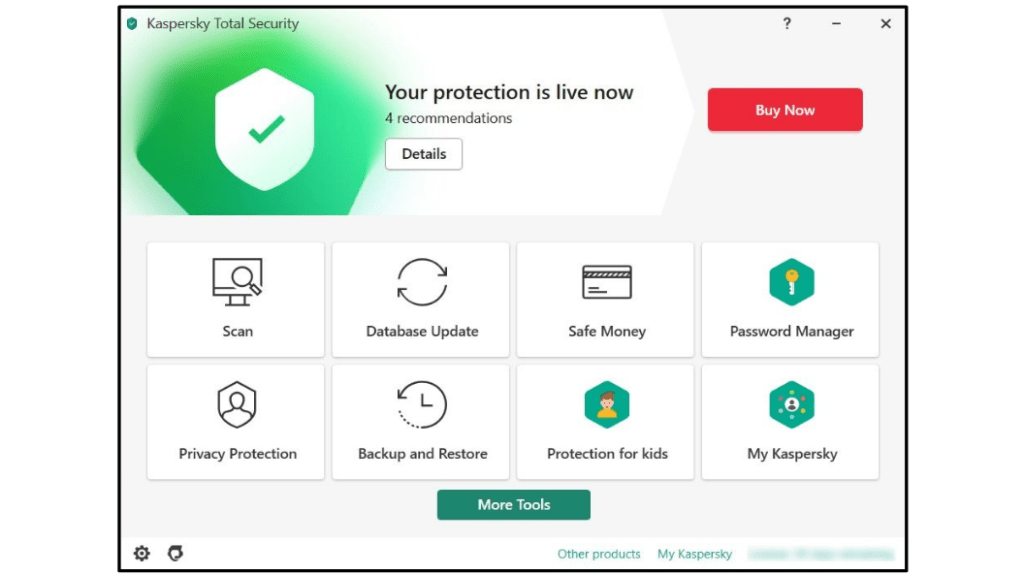
Kaspersky's malware scanner uses a virus database and cloud-based machine learning to detect all types of malware. When the scan detects something new and potentially malicious, the file is uploaded to Kaspersky's cloud-based scanner for further analysis. The cloud-based scanner then uses machine learning to identify whether or not the file is actually malware.
Kaspersky caught 100% of the malware samples I downloaded during my tests, which puts it among the best antiviruses on the market like Norton, Bitdefender, and McAfee (like Kaspersky, these brands also use a combination of signature databases and machine learning).
Kaspersky has 6 different types of virus scans:
- Quick Scan — Scans system startup files, system memory files, and boot sectors.
- Background Scan — Scans startup objects, memory files, and system partitions when your computer isn't active.
- Full Scan — Scans every file, folder, and partitioned sector on your system.
- Selective Scan — Allows you to scan any drive, file, or folder.
- Removable Drive Scan — Allows you to scan removable drives, such as USB sticks or portable hard drives.
- Vulnerability Scan — Scans for vulnerabilities in your system, including out-of-date applications and software exposed to malware.
Kaspersky also offers a wide range of scan-scheduling options, including the options to scan at a specified time, after application startup, and after every update.
To test Kaspersky, I hid nearly 1,000 test malware samples on my computer, including viruses, trojans, rootkits, ransomware, and keyloggers. I then ran a Quick Scan, which only took 2 minutes to complete. This is pretty quick. For perspective, when I ran a Quick Scanon VIPRE, it took 10 minutes — that's 5 times slower!
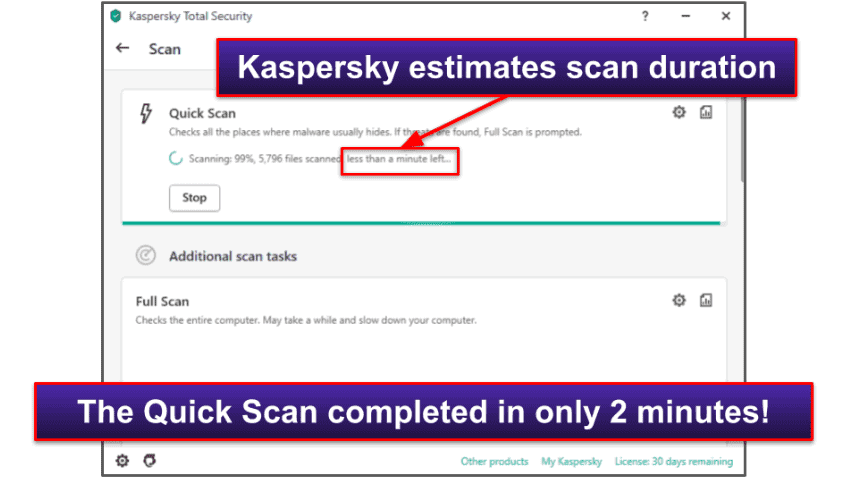
Kaspersky's Quick Scan didn't find every malicious sample I hid on my system, but since the Quick Scan only looks in critical areas — such as those loaded when your OS starts up — this was to be expected. That said, because the Quick Scan found around 50% of the samples, Kaspersky immediately suggested I complete a Full Scan to look deeper into my system, which I did next.
The Full Scan took around 45 minutes, beating Bitdefender's 1-hour scan time, and found every single malware sample on my system. Also, while Kaspersky was scanning my system, I didn't notice any system slowdown — I was still able to use my computer at normal speeds. In comparison, McAfee's full scan slowed my system down quite noticeably. When the scan was complete, I could see all of the detected malware files in the Quarantine window.
Despite quarantining and deleting the infections, Kaspersky still gives you the option to restore them. While most users wouldn't want to do that, this option allows you to restore legitimate files that shouldn't have ever been removed. However, during my tests, Kaspersky didn't give me any false positives.
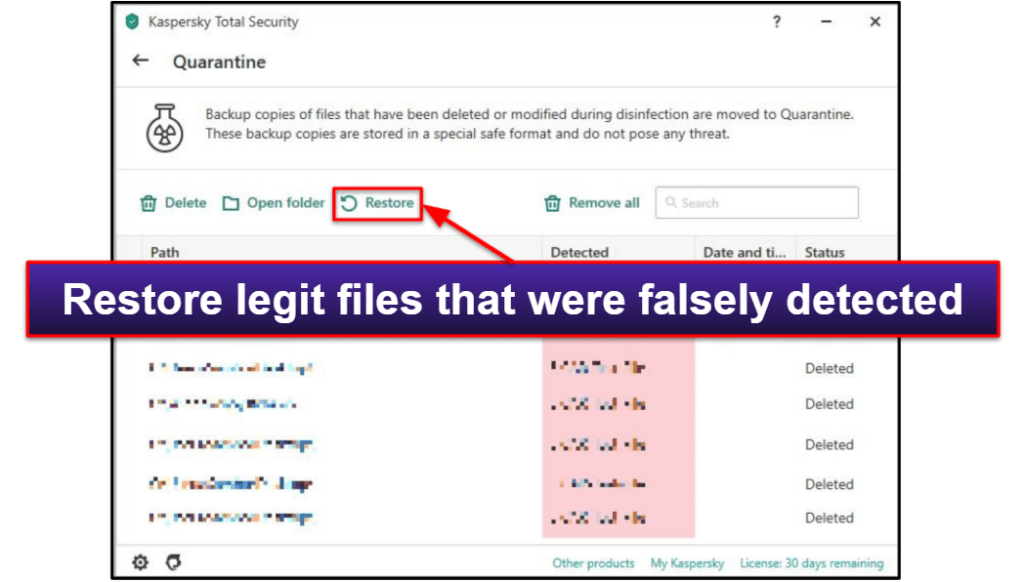
Kaspersky's real-time protection also performed excellently in my tests, instantly blocking all of the malware samples I tried downloading to my computer. This puts Kaspersky on par with top performers like Norton and Bitdefender. Whenever Kaspersky detected a threat, it notified me that it had detected malware. I could then either opt to see more details about the malware or instantly remove it from my PC. I also ran a ransomware simulator, and it wasn't able to lock a single file before Kaspersky's real-time protection stopped it.
Finally, the Vulnerability Scan only found two instances of outdated software on my computer, but I was impressed with how detailed the vulnerability report was. For example, the scanner detected an outdated Photoshop version and gave a full rundown of the vulnerabilities I exposed myself to — including when the vulnerability was detected, how hackers take advantage of the vulnerability, and how to resolve the issue. However, one downside is that Kaspersky doesn't allow you to update apps from within the antivirus. Competitors such as Avira offer an auto-update feature that can quickly resolve all of the vulnerabilities on your system.
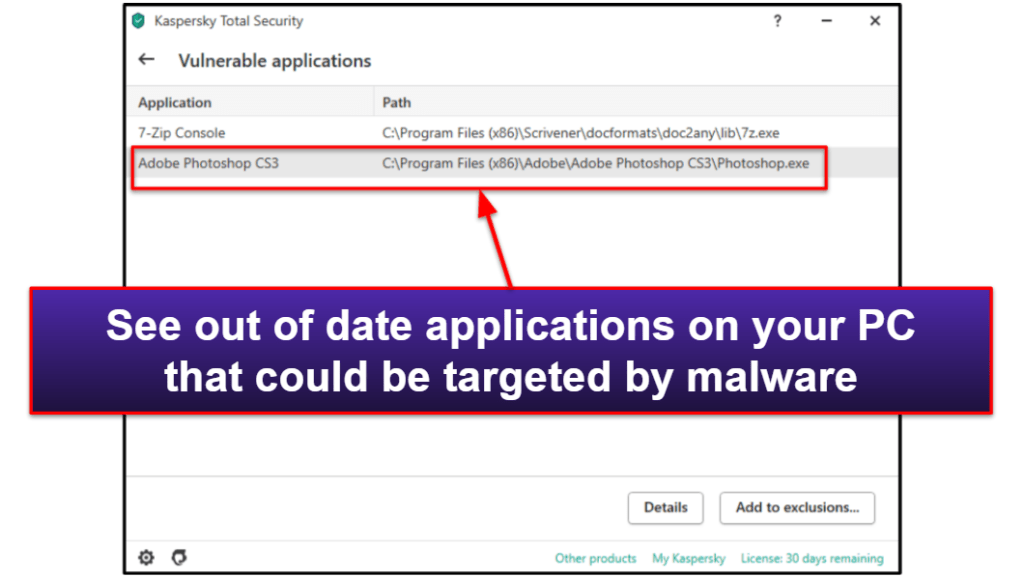
Overall, Kaspersky's antivirus engine is really good — it has a 100% perfect detection rate, with several types of scans to choose from, excellent real-time protection, and it doesn't slow down a system during a full system scan.
Visit Kaspersky
Web Protection
Kaspersky provides multi-layered web protection that works with Kaspersky's browser extension to detect and block malicious websites. The Web Anti-Virus feature compares the sites you visit against a database of malicious web addresses, and it also uses heuristic analysis to check URLs for suspicious behavior. The browser extension — which is installed with Kaspersky — also detects malicious links. Plus, it marks sites as safe/unsafe, blocks tracking and ads, and allows users to activate a virtual keyboard.
I visited known malicious websites during my tests, and Kaspersky blocked the vast majority of them. Kaspersky's results were pretty good — although competitors like Norton and Bitdefender were slightly better at detecting all of my test links.

Kaspersky's anti-tracking feature blocks tracking from social networks, web analytics, web beacons, and ad agencies — but you can also choose to allow data collection on specific sites. While I do like this feature, I'm not too happy that the default settings allow Kaspersky and its partners (a total of 82 sites!) to gather user data. Although it's fairly easy to block Kaspersky and its partners from collecting data, I'd still like to see Kaspersky ask users whether they're ok with this practice upon installing the extension.
From the browser extension, you can also open a virtual keyboard. Not a lot of competitors offer a virtual keyboard — Panda Dome has one, but it's not very good — so I think it's really cool that Kaspersky provides additional protection against keyloggers.
Kaspersky's virtual keyboard is best used in combination with Safe Money, a secure browser for online finances. Whenever you visit a banking or shopping site, Kaspersky asks you whether or not you want to add the site to Safe Money — and if you click on the Continue in Protected Browser button, Kaserpsky will open the site in Safe Money. I tested this feature on a number of banking sites, and Kaspersky asked me to add all of them to Safe Money. However, the secure browser took over 10 seconds to load each time, which is a bit annoying. Bitdefender also offers a secure browser, Safepay, which loads much faster than Kaspersky's Safe Money.
Overall, Kaspersky's web protection features are pretty good. The anti-phishing protection detected most of the phishing sites in my testing, and I also like that Kaspersky offers ad-blocking and anti-tracking — although I don't like that anti-tracking is turned off for Kaspersky and its 80+ partner sites. I also think it's really useful that Kaspersky has a secure browser and virtual keyboard for banking sites.
Visit Kaspersky
Firewall
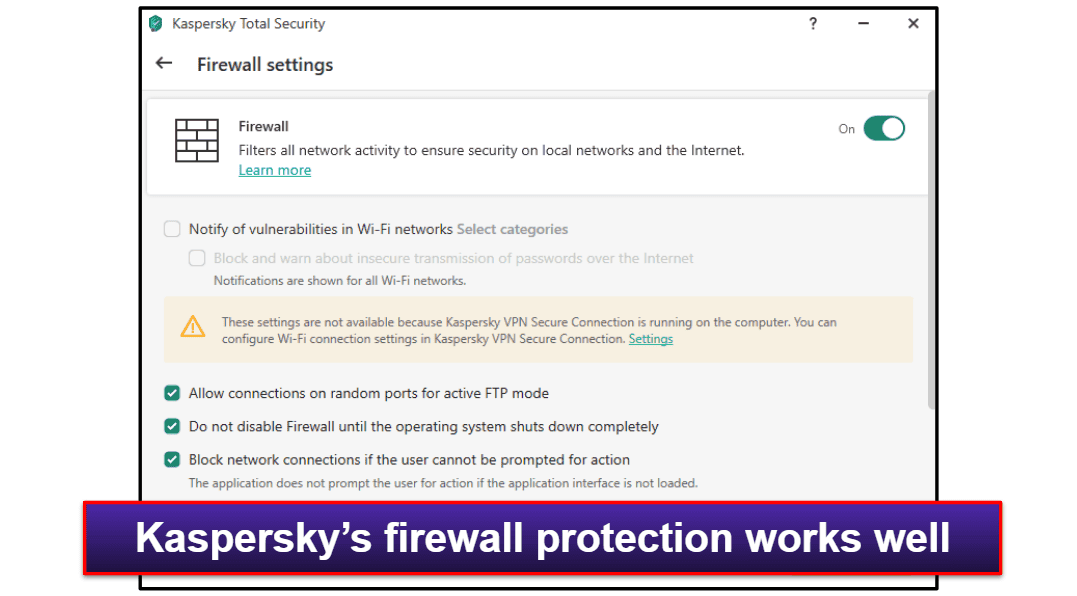
Kaspersky's firewall protects your Wi-Fi network from intrusions and exploit attacks. It blocked the majority of exploits attacks I tested against it, including several that the default protections in Windows Defender's firewall allowed through.
I like how Kaspersky shows detailed information about applications with an internet connection. I clicked on Microsoft Edge and was given a full breakdown of what the application is, how many users have it on their computer, and whether or not I could trust it. Kaspersky also makes it easy to adjust individual rules for applications — such as whether or not they can start or stop other processes.

There are also several features that advanced users will appreciate. For example, Kaspersky includes port access detection (which works quite well), lets you modify individual packet rules, and change permissions on connections such as DNS over TCP or DNS over UDP.

Honestly, I only have a couple of complaints about Kaspersky's firewall. Firstly, I found the interface to be quite clunky. For example, you can access some features (like the packet rules) from the firewall menu, but other features (such as the port access detection) are hidden away in the network settings menu. I much prefer how Norton keeps all of its firewall and network settings in one place. I was also disappointed that the Mac version of Kaspersky only includes a network attack blocker. Intego for Mac comes with a feature-rich firewall that works really well.
That said, Kaspersky's firewall is a great way to prevent network intrusions on a Windows-based PC. It blocked the majority of samples I tested against it and worked out of the box.
Visit Kaspersky
System Cleanup Tools
Kaspersky has several PC cleanup tools, including:
- PC Cleaner.
- Unused Data Cleaner
- Privacy Cleaner.
- Browser configurator tool.
- Microsoft Windows Troubleshooting tool.
Kaspersky's PC Cleaner searches your system for applications and browser extensions you may either want to remove or fix. This includes programs you rarely use and bloatware (software that came pre-installed on your computer). With Kaspersky's PC Cleaner, you can easily choose the category of applications you want the PC Cleaner to target, too, including apps that were installed without your consent, apps that slow down your startup time, or apps that show banners.
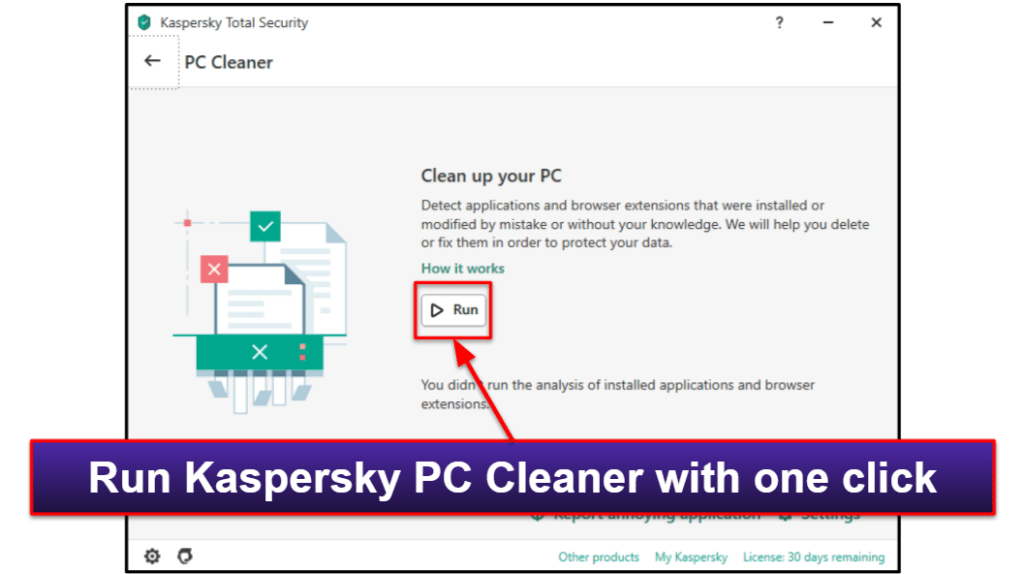
When I tested the PC Cleaner on my Windows 11 PC, it took 2 minutes to analyze my system, and the results were really impressive. The PC Cleaner discovered all the prepackaged bloatware and gave me options to remove, ignore, or perform a Google search to find more information about each program.

Kaspersky's Unused Data Cleaner checks for log and temporary files, as well as for files in the Recycle Bin. This scan took less than 1 minute, and it found several unused files. Like with the PC Cleaner, the Unused Data Cleaner gives you several options for handling these files.
However, I was disappointed with the browser configuration tool. While it can analyze your web browser security settings and alert you to vulnerabilities, it's only compatible with Internet Explorer. Microsoft discontinued Internet Explorer in 2022, so I'd really like to see this feature expanded to other web browsers.

That said, I liked the Microsoft Windows troubleshooting tool. While Windows has a built-in troubleshooter, Kaspersky found issues with my computer that the built-in troubleshooter missed.

Finally, the Privacy Cleaner cleans browser history, cookies, and other traces of your online activity.

Kaspersky's system cleanup tools are ok, but I'd like to see more system optimization tools added. The program lets you postpone system scans when your battery is running low or when your system's CPU is at a high load, but that's pretty much it. Competing antiviruses like Avira also include system speedup tools, a startup optimizer, and other advanced PC optimization tools. That said, some antiviruses like Sophos don't even have system cleanup tools.
Overall, Kaspersky's system cleanup features let you quickly and easily get rid of unwanted or unused files and remove traces of your online activity. These tools aren't the best on the market, but they work as promised, and they can even speed up your computer a bit.
Visit Kaspersky
Virtual Private Network (VPN)
Kaspersky's free VPN comes bundled with Kaspersky's Internet Security and Total Security plans (with a 200 MB daily limit). The free VPN only lets you connect to one server. Unfortunately, even if you subscribe to Kaspersky's highest-tier payment plan, you won't get access to the VPN with unlimited browsing data. In contrast, Norton includes a VPN with unlimited data even with its cheapest plans. However, if you like Kaspersky's VPN, you can purchase the premium version of the VPN as an add-on.
Kaspersky's premium VPN has:
- Unlimited browsing data — No daily data limits.
- Kill switch — Stops data transfer if the VPN is disrupted.
- Full leak protection — Prevents your IP address leaking, revealing your personal data.
- Smart Protection — Automatically starts the VPN when connected to a public network.
- Servers in 30+ countries — Users can connect to any server, including the fastest one.
I was interested in seeing how both the free and premium VPN performed in speed tests, so I ran a speed test on each of them. First, I ran a test with the VPN turned off, and then with the VPN turned on. Here are the results:
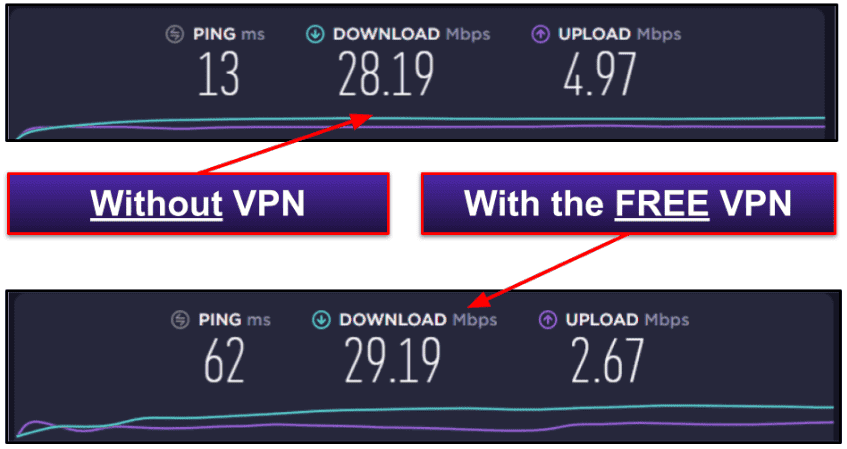
As you can see, with the free VPN running, my download speed was unaffected (it even increased a bit). However, my ping and upload speed slowed down by over half, and this was noticeable when I tried to share files over P2P networks.
Next, here are the results on the premium version of the VPN, connected to Kaspersky's fastest server:

Interestingly, my upload speed dropped even more on the premium VPN — but my ping was significantly lower, which was clear in my browsing speed. I could browse the internet without any noticeable difference in speed compared to when the VPN was switched off. My download speed increased again, probably due to ISP throttling.
Another thing I like about Kaspersky's premium VPN is that it works with popular streaming services like Netflix. This means if you have a US Netflix account and are traveling abroad, you can still access Netflix's US library with Kaspersky's VPN. Avira's VPN doesn't work as well with Netflix, so Kaspersky is a better choice in this regard.
While the free VPN isn't that good, the premium VPN is pretty good for an antivirus-bundled VPN, with a decent number of servers worldwide, fast speeds, and access to popular streaming services. But it's a separate purchase, and it doesn't come included with Kaspersky's main antivirus package.
Visit Kaspersky
View our full Kaspersky VPN Review
Password Manager
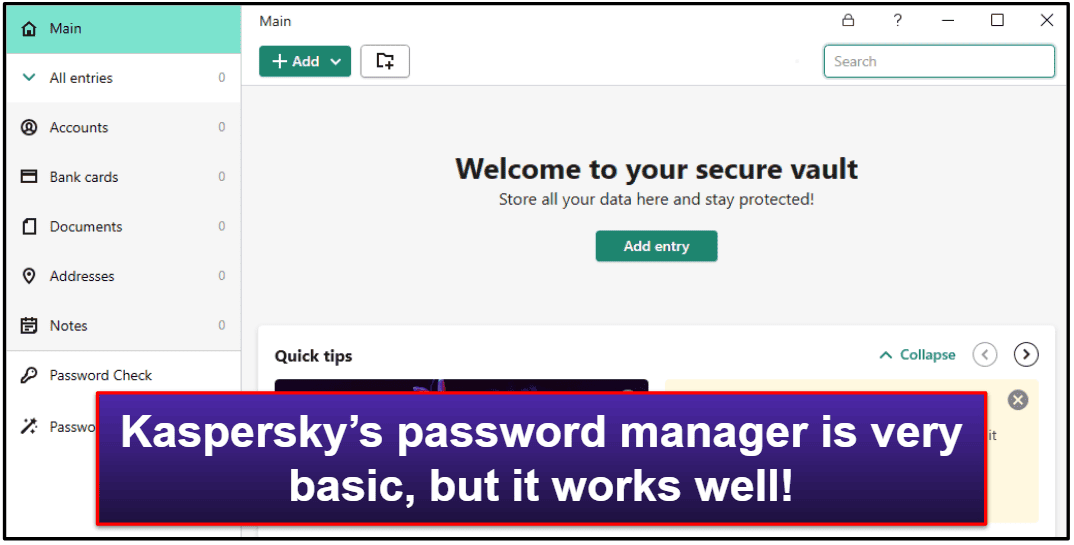
Kaspersky's password manager isn't bad, but it may be too basic for some users. It secures all of your passwords and other sensitive data — like bank cards, addresses, and notes — with 256-bit AES encryption and a strict zero-knowledge policy.
The premium password manager doesn't limit the number of passwords you can store, but the free version only lets you store 15 passwords — which really isn't enough for most people. It's also a little disappointing that the premium password manager is only available with Kaspersky's most expensive antivirus plan.
Kaspersky's password manager is very easy to set up and use. When you first open the program (which needs to be installed separately from the antivirus), you need to create a master password. If you ever lose this password, Kaspersky won't be able to help you access your password vault. While it's great that Kaspersky is a true zero-knowledge password manager, I'd like to see it add account recovery options or emergency access like Dashlane and LastPass have. After you import all of your passwords, you'll need to install a browser extension (available for Chrome, Firefox, Comodo Dragon, Yandex, Edge, and Safari) to be able to auto-save and auto-fill passwords.
During my tests, Kaspersky's auto-save and auto-fill worked perfectly every time. But keep in mind that Kaspersky can only auto-fill bank cards and addresses on PCs and Macs, not on mobile.
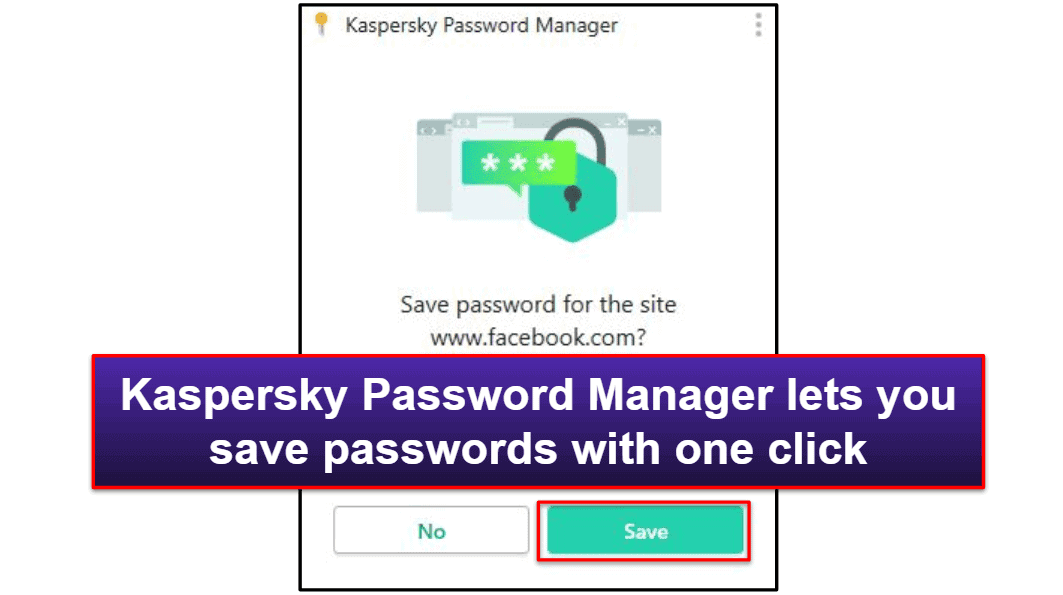
Kaspersky's password vault is very simple to navigate. All of the features and options are clearly labeled and easily accessible. In addition to adding passwords (both for websites and applications), you can add bank cards, documents, addresses, and notes. Kaspersky also lets you organize your passwords into as many folders as you want.
Kaspersky has a good password generator that you can access both from the app and from the browser extension. The generator can create passwords 4–99 characters long, including uppercase and lowercase letters, numbers, and symbols. However, there are no options to create passwords that are 'easy to say' or 'easy to read' — this is something that password managers like LastPass offer.
However, Kaspersky lacks a lot of other features that are included in many of the better standalone password managers — including two-factor authentication (2FA) and encrypted cloud storage. Although Kaspersky allows you to log in using Windows Hello — which secures your account behind a pin number, facial recognition, or biometrics — I'd really like to see support for authenticator apps like Google Authenticator — which 1Password offers.
Overall, Kaspersky's password manager is basic and lacks many features dedicated password managers have. But if you only need an easy-to-use, secure password manager for storing your passwords and other sensitive data, Kaspersky's password manager is fine.
Visit Kaspersky
View our full Kaspersky Password Manager Review
Parental Controls
Kaspersky's parental controls (Safe Kids) are pretty good — they're very intuitive and come with a lot of features that make it easy for you to protect your kids online. Like the password manager, the parental controls are also downloaded as a separate app. Setup only takes a couple of minutes and includes a quick tutorial as well as advice on how to talk with your children about parental controls and internet safety.
Here's what's included with Kaspersky's Safe Kids:
- Content filtering for sites and apps.
- Usage limitations.
- YouTube monitoring.
- Location tracking (Android and iOS only).
- Geofencing.
- Social network monitoring (VK only).
- And more…
Kaspersky's content filtering worked pretty well in my tests — I could block sites based on categories and couldn't bypass those blocks using top VPN programs. I could also set up specific exclusions and enable Safe Search to prevent inappropriate content from appearing in search results on popular browsers like Google, Yahoo, Bing, and Yandex. You can even do the same for YouTube! However, while you can monitor your kid's YouTube searches, you can't see the actual videos they've been watching like you can with Qustodio.
There's also an option to block apps based on categories, including entertainment apps like games. However, the app blocker is limited on iOS and doesn't let you choose which apps to block. If you want to do that, you should consider another parental control tool instead.
During my tests, I could also easily set up weekly computer schedules, and I could also choose to block my test computer when a specified time limit was reached.
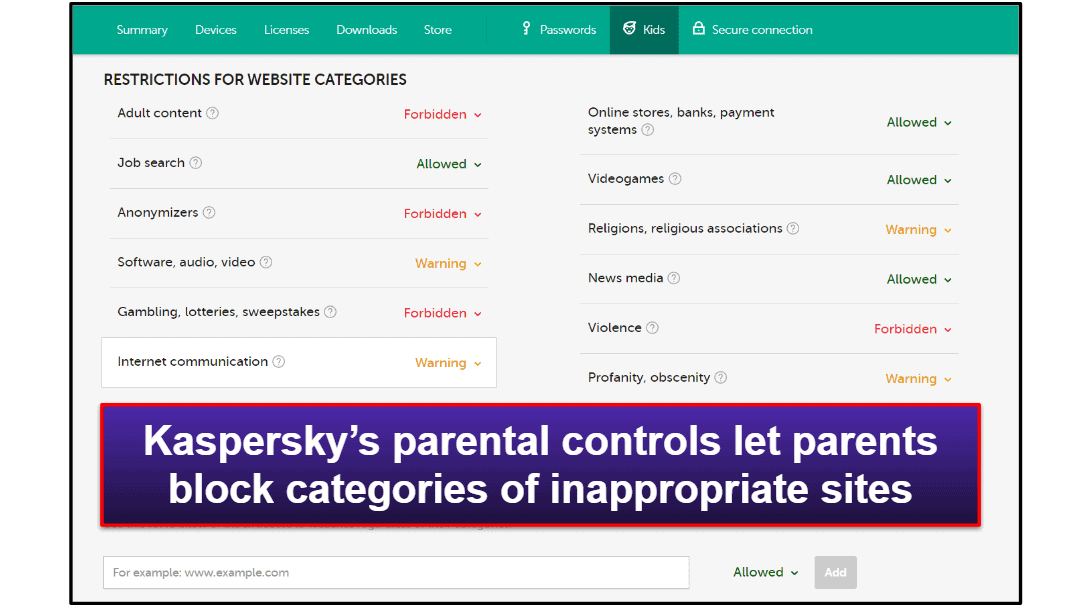
I tested the location tracking and geo-fencing features, and they were able to accurately track the location of my Android phone (and send alerts if the phone left the designated safe area). My only complaint with the location tracking is the lack of a historical view, so you can't see a list of places your kid has been to recently like you can with Norton Family.
I'm pretty happy to see that Kaspersky Safe Kids includes social network monitoring — most competing antiviruses with parental controls don't have this feature. However, it only works with VK — a Russian social media website — so if you want to monitor your kid's activity on sites like Facebook and Twitter, you should consider choosing a standalone parental control like Bark instead.
Overall, Kaspersky's parental controls are some of the most comprehensive on the market, despite only having limited iOS support and social media monitoring. Not only are they full-featured and easy to use — there's even advice from Kaspersky on how to talk with a child about parental controls.
Visit Kaspersky
View our full Kaspersky Safe Kids Review
Additional Features
Kaspersky has a few extra tools, including:
- Webcam and microphone protection (specific apps only).
- Privacy protection.
- Ad blocker.
- Backup and Restore.
- Rescue Disk.
- Data encryption & shredder.
- Gaming mode.
The webcam protection feature notified me any time I accessed an app that used my laptop's webcam, like Skype or Zoom. However, I wish it was compatible with more webcams. It only has guaranteed compatibility with 10 cameras. Bitdefender's webcam protection works with most webcams.
Privacy protection stops websites from tracking your personal data, and it works well. When I enabled it and ran a tracking tester, I found Kaspersky was successfully blocking tracking ads, invisible trackers, and fingerprinting — which is great!
However, I was less impressed with the ad blocker feature. With it enabled, I visited an ad-heavy website, and unfortunately, I could still see lots of ads. TotalAV includes a much better ad blocker.
Backup and Restore lets users backup files to a removable drive or online cloud service — you can either use Dropbox (default option) or connect Kaspersky with another service. However, I don't think this feature adds much value, as Dropbox gives all users 2 GB storage space for free, after which you'd need to upgrade to get more storage space. While I think it's ok that Kaspersky offers a backup option, there are better ones out there (like Norton, which offers more storage space and doesn't make you subscribe to another service).
Kaspersky's Rescue Disk feature is pretty useful — it helps to clean up a computer infected with malware upon startup. To use this feature, you need to download Kaspersky Rescue Disk and upload it to a USB or CD/DVD, which you'll then use to disinfect your PC. There are a couple other antiviruses that offer this — like ESET and Panda.
Finally, the gaming mode pauses scans and notifications during gameplay or whenever you open an app in full-screen mode. Kaspersky's gaming mode is ok, but Norton is better — it offers a specialized game booster that actually improves performance during gameplay.
Kaspersky's additional tools are pretty decent. However, I'd like to see the company add advanced tools like dark web monitoring and identity theft protection to its premium plans. Top competitors like TotalAV offer dark web monitoring and identity theft protection for US users, while antiviruses like Norton and McAfee expand identity theft protection to users in Canada, the UK, Australia, parts of Asia, New Zealand, and most of Europe.
But I do appreciate that Kaspersky offers a couple of useful extras, especially considering that most antiviruses only offer basic antivirus and internet security protection. While I don't think Kaspersky's Backup and Restore feature is too useful, I like the Rescue Disk functionality that lets you save critically infected computers.
Visit Kaspersky
Kaspersky Plans and Pricing
Kaspersky offers 3 packages, and given the number of features each package includes, they're quite reasonably priced.
The available packages are:
- Kaspersky Anti-Virus (Essential Suite).
- Kaspersky Internet Security (Advanced Suite).
- Kaspersky Total Security (Premium Suite).
Kaspersky provides coverage for up to 10 devices. With Kaspersky Anti-Virus, you can choose if you want protection on 3, 5, or 10 Windows computers. Kaspersky Internet Security covers 3, 5, or 10 Windows, Mac, or Android devices. And Kaspersky Total Security can protect 3, 5, or 10 Windows, Mac, Android, or iOS devices.
Here's an overview of all 3 plans:
Unfortunately, there's no free product in Kaspersky's main antivirus product line. However, a discontinued product called Kaspersky Anti-Virus Free has been repackaged as Kaspersky Security Cloud Free. It doesn't offer many of the features mentioned in this review, but it does have basic antivirus protection. If you're looking for a more feature-rich free plan, however, Avira's is one of the best on the market.
Visit Kaspersky
Kaspersky Anti-Virus — Entry-Level Plan (Windows Only)

This is Kaspersky's most basic paid plan that only covers Windows devices. It provides the following features:
- Real-time protection.
- Anti-phishing protection.
- System tuneup tools.
- Free password manager (stores up to 15 passwords).
- Rescue Disk.
If you're looking for a lightweight, easy-to-use Windows antivirus product, Kaspersky Anti-Virus is a decent choice, and at IDR464,810 / year, it's really low cost.
Visit Kaspersky
Kaspersky Internet Security — Best-Value Plan for Most Users

Kaspersky's mid-tier plan works on Windows, Mac, and Android devices, and it offers all of the features mentioned above, plus:
- Secure web browser.
- Webcam protection.
- Payment protection.
- VPN (200 MB daily limit).
- Ad and tracking link blocker.
- Free parental controls (content filtering and device usage).
Kaspersky Internet Security adds a couple of important features, and with prices starting at IDR619,800 / year, it only costs a little more than the entry-level Anti-Virus plan. Plus, it offers protection for Mac and Android as well as Windows.
Visit Kaspersky
Kaspersky Total Security — Advanced Plan with Strong Extras
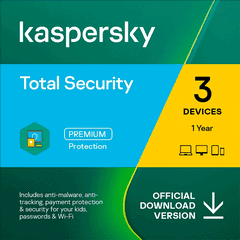
This is Kaspersky's premium package that covers Windows, Mac, Android, and iOS. It includes all of the features from the previous plan, plus:
- Parental controls (premium version).
- Password manager (premium version).
- Backup and Restore.
- Data encryption (Windows only).
Kaspersky's password manager is an ok addition to an already comprehensive internet security suite, and the parental controls are among the best on the market.
Overall, Kaspersky Total Security is a good choice for users looking for a strong antivirus alongside excellent parental controls and a basic password manager. You can get it for IDR697,290 / year.
Visit Kaspersky
Kaspersky Ease of Use and Setup
Kaspersky is straightforward to install and set up, and its user interface is very clean. The main features, such as the antivirus scanner, secure browser, and password manager, are all accessible through large, clearly marked buttons. If you only want the most basic features from this antivirus, Kaspersky is very simple to use.
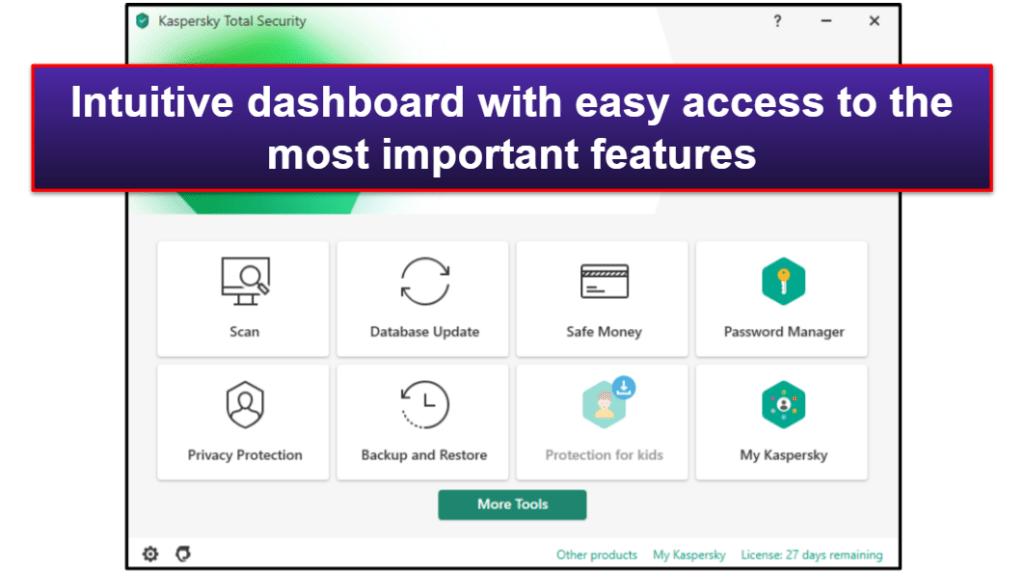
That said, some of Kaspersky's tools can be difficult to find. For example, to use the PC Cleaner, you have to click on More Tools, Clean and Optimize, and then PC Cleaner. If you don't know the tool is included, you may never see it. IIt would be good if Kaspersky had a side-bar like the one TotalAV uses, making everything available and easy to access.
Once you get used to Kaspersky's UI, however, it's very organized. There are even ways to customize your experience. Most features have small settings icons next to them that allow you to control various options.
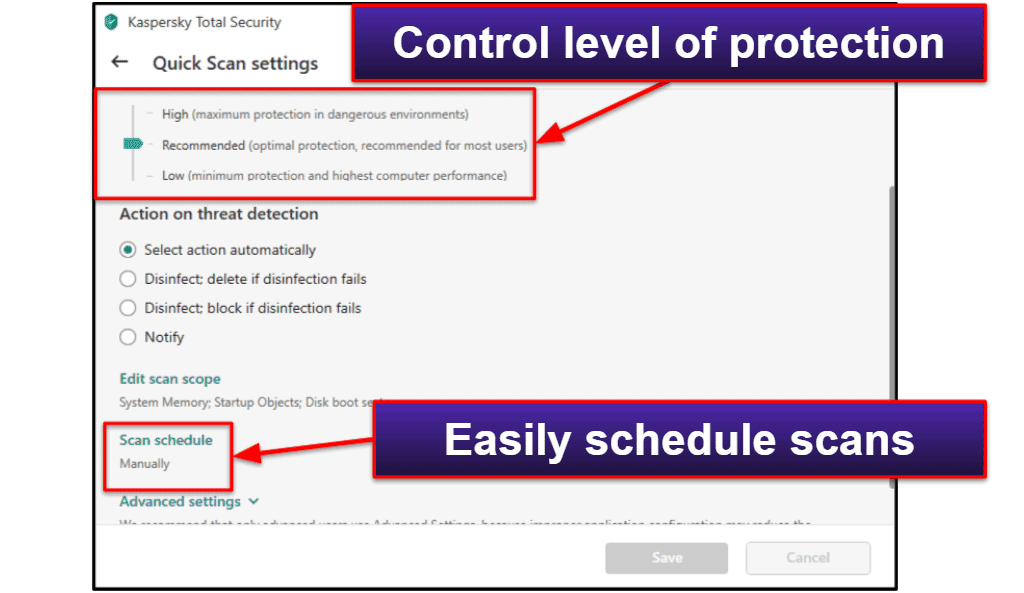
One area I particularly like is the Notification Center, which can be accessed from the main Kaspersky window. It shows you critical information and allows you to decide what to do with it.
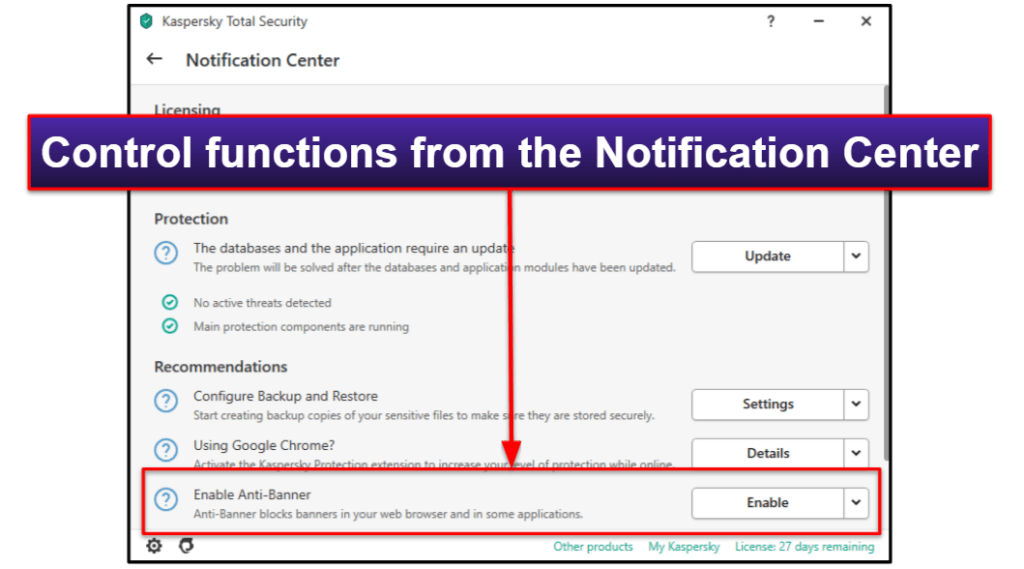
The Notification Center makes the essential functions simple to turn on or off. Many antiviruses with a notification center simply alert you to something being disabled and take you to the relevant tool when you click on it. With Kaspersky, you can quickly resolve security issues without having to leave the Notification Center.
Kaspersky's layout takes a little getting used to, but once you do get used to it, it's really quick to navigate and easy to use. And I love that the customization options give you full freedom, making for a great interface that feels complete no matter which plan you choose.
Visit Kaspersky
Kaspersky Mobile App
Kaspersky offers a complete internet security app for Android. iOS users, on the other hand, only get access to basic security features, the parental controls, the password manager, and the VPN.
Kaspersky's Security & VPN for Android has:
- Antivirus scanner.
- Call blocker.
- Anti-theft.
- Real-time protection.
- App lock.
- Anti-smishing (SMS phishing).
- Browsing protection.
The antivirus scanner can be started with one tap from within the application. You can perform the following scans:
- Quick scan — Scan installed apps for malware.
- Full scan — Scan entire device for malware.
- Folder scan — Scan a selected folder.
Kaspersky detected every malware file I hid on my phone in less than 5 minutes and automatically quarantined them.
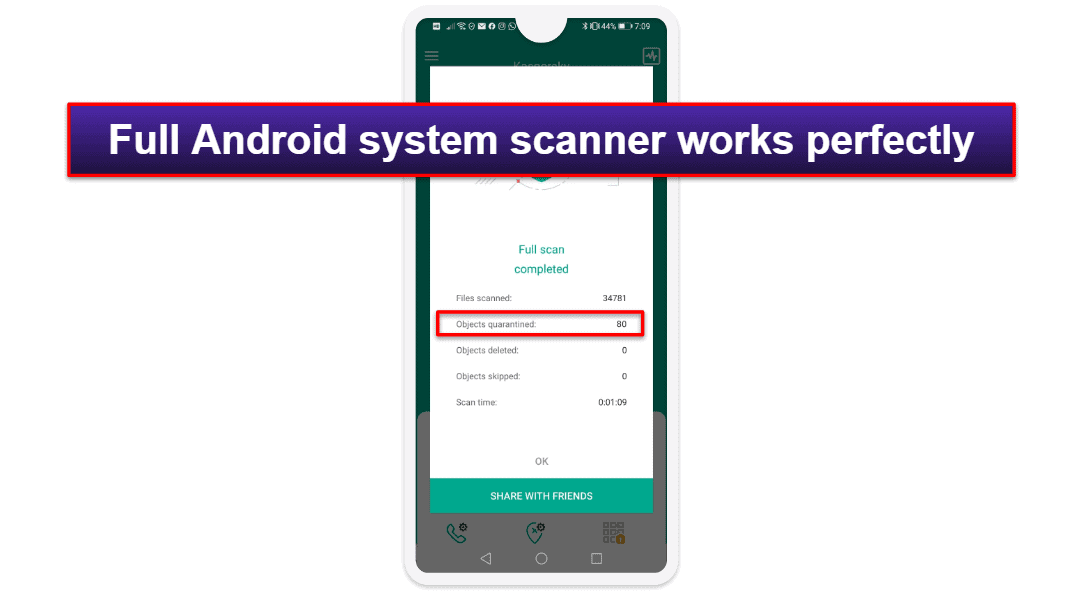
The app's real-time protection also worked really well. It detected all of the malware traces I tried putting on my phone and even stopped me from downloading dangerous apps on the Google Play Store. This is a convenient feature, but I must admit, I much prefer Norton's Mobile Security's App Advisor, which can warn you about apps before you download them. Even so, Kaspersky still intercepted dangerous app downloads and immediately quarantined them, keeping my device protected.
The Kaspersky mobile app also offers free anti-theft protection. You need to make a Kaspersky account for it to work, as using it requires you to log into the My Kaspersky online hub. Once you log into My Kaspersky, you get 4 anti-theft features:
- Lock the device.
- Wipe the device.
- Sound an alarm.
- Capture an image of the person using your lost or stolen device.
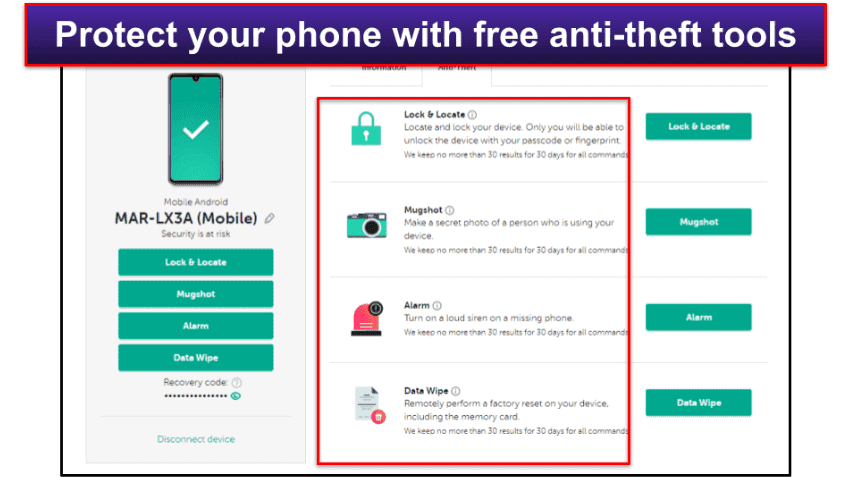
Kaspersky's anti-theft tool also lets you block your device if a thief inserts a new SIM into the phone. What's more, you can protect the Kaspersky app from being uninstalled. These are two excellent ways to create a strong anti-theft shield.
Kaspersky's free mobile VPN is better than the free PC VPN. To test the speeds of the VPN,
I connected to Kaspersky's free server — which comes with a 200 MB daily limit — and ran a speed test, making sure I had mobile data switched off so it wouldn't interfere.
Here are the results of my speed test with the free VPN:

Here are my speed test results with the premium VPN:
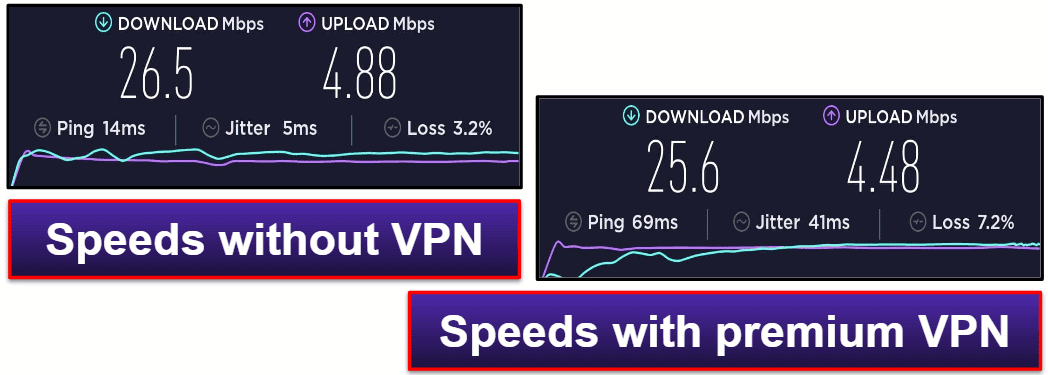
The mobile VPN provides good speeds overall. With the free version, there was a bit of slowdown in download speeds and ping, but my upload speeds didn't slow down nearly as much as the PC version of the VPN. With the premium version, both download and upload speeds stayed about the same.
Security Cloud for iOS has:
- Adaptive security — Changes settings based on user behavior. For example, connecting to a public network will automatically activate the VPN.
- Security live — Fixes weak settings in your iOS, for example a vulnerability in the OS due to jailbreaking.
- Account check — Checks your email for data breaches.
- QR scanner — Scans QR codes and lets you safely access the information encrypted in them.
Overall, the Kaspersky mobile app isn't the most in-depth I've seen. It lacks many features competitors like Avira have, such as performance optimization features, a network scanner, and identity protection. But Kaspersky's mobile app isn't bad — the scanner had perfect detection rates in my testing, and the anti-theft tools are among the best around.
Visit Kaspersky
Kaspersky Customer Support
Kaspersky has 4 different options for customer support, including:
- Email support.
- 24/7 live chat.
- Phone support.
- Knowledge base.
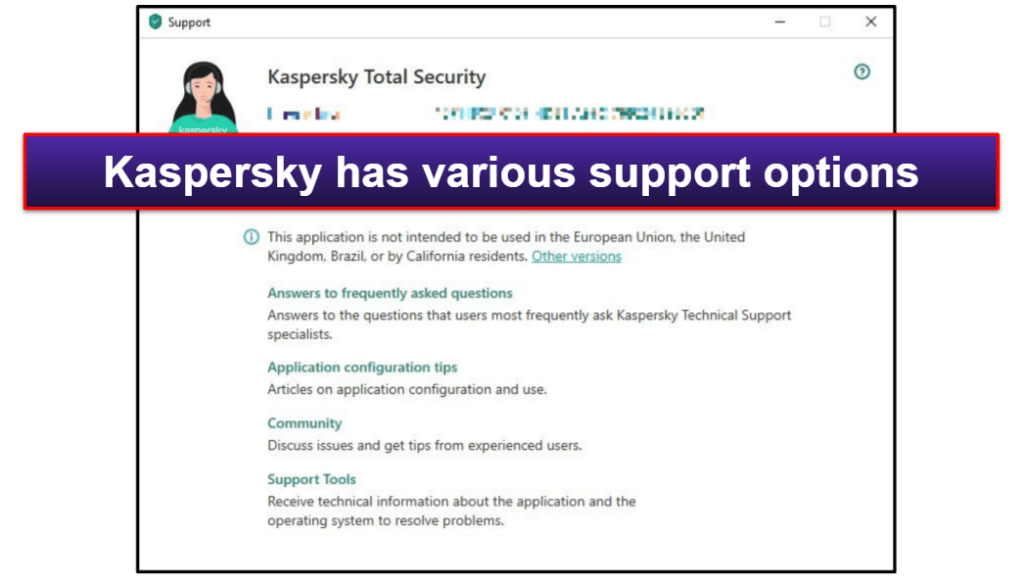
It was a little hard to navigate Kaspersky's customer support, and it felt as if the company wanted me to use the knowledge base and community answers instead of contacting a representative. For example, Kaspersky's desktop app has a support button on its main page, but when you click on it, all you get is a pop-up window. There's no way in the application to contact a representative or to access Kaspersky's knowledge base. I actually had to search for the knowledge base on Google to access it. I wasn't impressed by this — other top brands like Bitdefender make their knowledge base really accessible.
It's also pretty difficult to get in touch with customer support. On Kaspersky's communication channels, I chose to contact customer support via phone, and instead of giving me a phone number, the site took me to another form to fill out. I filled that form out… and then I was given another prompt asking if I was sure I wanted to contact support! Luckily, when I eventually did fill out all of the forms and got to Kaspersky's phone number, they answered me quickly and were able to resolve my problem.
Kaspersky's live chat is better than the phone support. I had to fill out the same forms to access Kaspersky's live chat support, but I connected with an agent in around 2 minutes. The customer support agent was really friendly and solved all of my issues.

The email support is also decent. I sent an email saying I was having problems updating the desktop application. Their response came in just over a day, which is pretty standard for email support. The customer support team was able to help me, but I was a little surprised they didn't call me by name. Being known as "customer" over email despite it being a direct support ticket felt very impersonal and unwelcoming. With competitors like Bitdefender and Avira, you'll get a more personalized response.
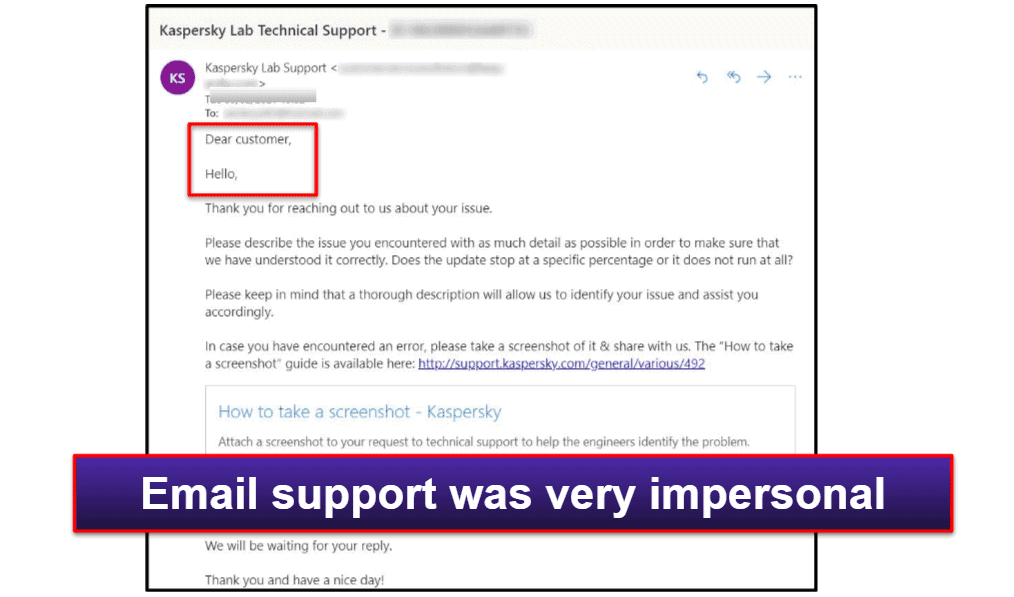
Overall, getting in touch with Kaspersky requires more work than with other antiviruses I've tested. However, it was good not having to explain my issues to the support agents. Thanks to the forms, the customer support agents have the exact details they need when you reach out to them, and they can provide quick solutions.
Visit Kaspersky
Is Kaspersky a Safe Antivirus?
Yes, Kaspersky is a safe antivirus. Kaspersky was involved in a serious scandal a few years ago — while the company denied collaborating with the Russian government, the accusations damaged its reputation. But Kaspersky has since started its Global Transparency initiative in an effort to restore both its reputation and the trust of its users.
Kaspersky's perfect malware detection rates are on par with some of the biggest names in the cybersecurity industry, including Norton, McAfee, and Bitdefender. Kaspersky also has pretty good web protection features, including decent anti-phishing protection and extras like a secure browser, virtual keyboard, and anti-tracking protection.
It comes with a range of additional tools, including system cleanup tools, a VPN, a password manager, parental controls, file encryption and shredding, file backup, and a Rescue Disk which helps clean infected computers. I really like Kaspersky's parental controls, which allow parents to set up usage schedules, content filters, location tracking, and social media monitoring. The parental controls also have geo-fencing, alerting users when a child leaves a predefined safe zone.
Kaspersky lacks some of the features I want to see in a premium internet security package, like dark web monitoring, identity theft protection, and a more full-featured VPN (all things Norton 360 has). And I was pretty disappointed with Kaspersky's customer support — finding a way to contact a customer support representative is way too difficult and time-consuming.
But overall, Kaspersky is a good product, with excellent malware detection rates, lots of useful and well-made features, an intuitive dashboard, transparent company practices, and reasonable prices. If you're interested in Kaspersky, you can try out the company's plans with a risk-free 30-day money-back guarantee (money-back guarantee terms may differ depending on your location).
Visit Kaspersky
Can Kaspersky be trusted?
Absolutely! Kaspersky faced controversy in 2017 following allegations that it had links with the Russian government. But since then, Kasperksy has been working hard to show users it can be trusted through its Kaspersky Global Transparency Initiative — which provides exact information regarding Kaspersky's source code, threat detection rules, and data collection processes. Kaspersky also passed the Service Organization Control for Service Organizations (SOC 2) Type 1 audit in 2019.
Can Kaspersky detect malware?
Yes, Kaspersky is excellent at detecting malware. I thoroughly tested Kaspersky's malware scanner after hiding nearly 1,000 samples on my Windows computer, and Kaspersky's full system scan detected all of the test malware. Kaspersky's real-time protection is also excellent, blocking all of the test malware before I could download any of it onto my computer. In terms of malware protection, Kaspersky is up there with the best antiviruses of 2022.
Which Kaspersky version should I buy?
Kaspersky has 3 different plans, including Kaspersky Anti-Virus, Kaspersky Internet Security, and Kaspersky Total Security. Kaspersky Total Security is the best choice if you're looking for a comprehensive internet security suite with a password manager and excellent parental controls. However, if you don't need a password manager and only need basic parental controls, Internet Security is just fine (but it doesn't cover iOS). Users looking for basic antivirus protection for Windows should check out Kaspersky Anti-Virus .
Is Kaspersky banned in the US?
Kaspersky isn't banned in the US for personal use. However, in 2017, former US president Donald Trump banned the use of all Kaspersky products within the US government. Kaspersky, on the other hand, denied giving information to the Russian government or collaborating with any other government. To regain the trust of its users, Kaspersky started its Global Transparency Initiative, allowing governments and partners to review its source code, learn more about its data collecting and processing practices, and more.
Source: https://www.safetydetectives.com/best-antivirus/kaspersky/
0 Response to "Kaspersky Cannot Guarantee Authenticity of the Doamin What Should I Do Disconnect or Continue"
Post a Comment